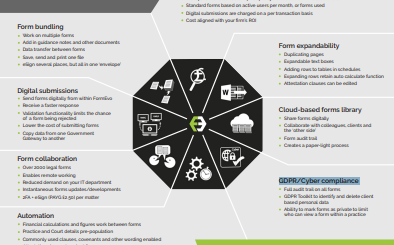How to set and meet targets: A business briefing for lawyers

Welcome to the April edition of Back to Basics — a Business Briefing for Lawyers. This month the focus is on setting and meeting targets
If you can’t see it, you’ll never hit is—unless it’s a complete fluke! A target is something that you need to focus on and aim for and have in front of you every day.
You can set targets in many areas of your business. Some might be (arguably, must be) financial targets, some may be targets associated with the types of work you do, some might be set to govern the amount of time you spend on doing certain things—and others may be to cease doing certain things. There are many targets you can set and it’s good to set them, providing they do fit in with your overall objectives.
If you need any help in this area, please get in touch with me—I’d be delighted to help.
Brian O’Neill LL.B MBA
Business Consultant
40c Drakemyre
Dalry
North Ayrshire
KA24 5JE
t. 07855 838395
Why bother to set targets?
If you can’t see it, you’ll never hit it. I mentioned this in the leader article and think it’s a phrase worth repeating. Isn’t it amazing how solicitors tend to look on sales as a “dirty” word when really what solicitors do every day is sell their personal services. Clients don’t pay you for the bits of paper you produce—they pay you for your skill in a certain area or field. So, every time you speak to a potential client for the first time, remember that what you’re doing is seeking to do business with them—you are selling yourself and your services.
So, I hear you say, what’s all this about targets. Simple really, do you have any? If you don’t, that suggests that you’re rudderless. Do you go to work every day in the hope that something will happen to keep you in business? Do you wait for the phone to ring and for someone to ask you to do something for them? Believe it or not, many solicitors, even in these austere times, do exactly that and still believe that business will simply turn up at their door without them having to do a thing to attract it. Believe me, these days are numbered and, with the advent of Alternative Business Structures, the non-lawyers who become involved in the provision of legal services will make sure that they get their sales messages across. Sales targets are common in the commercial world—there’s no reason they shouldn’t be employed in the legal profession.
Targets are things that keep you focused on your objectives. Every business needs a set of Objectives to strive for. The targets are the steps along the way that help you achieve them. They help you break down the overall Objectives into smaller steps or parts. They help you monitor your progress and to work out whether you’re moving towards or away from your Objectives.
Targets will help you when you set your priorities and work with your daily task lists. If you have targets to work to then it’s more likely that you’ll do something every day that will help you to achieve them.
So, there you have it. Setting targets helps you to focus on your objectives, determine your daily priories, gives you direction, measure your performance and generally avoid wasting endless hours going round and round in circles.
Any target, properly set, will help you to improve your business performance and increase your financial welfare.
Please don’t forget the targets you can set NOT to do something. Do you have a tendency to take on non-profitable work or work with which you are not familiar and which takes you a long time to complete—and with very little return? You might just want to have a target to stop doing this kind of work—and then you can focus on your positive targets and give yourself a better chance of hitting them.
Simon says…..
Setting targets; that sounds a lot like ‘Sales’ doesn’t it? Which is a bit scary so, just for fun, I thought I would search all my previous articles for Back 2 Basics and count the number of times I have used the word ‘target’. The answer is 8. All of the contexts are related to Marketing – targeting services at targeted clients and prospective clients. So obviously Targets can be applied to a few things and some obvious examples are:-
- A targeted increase in Fee revenue of X value or percent – for the Firm, for the Department, for each Fee Earner.
- A targeted decrease in Expenditure of X value or percent – for the Firm, for the Department for each Fee Earner.
What about:-
- A targeted increase in Active Case Files of X number or percent – across the Firm, Department or Fee Earner.
- A targeted increase in Average Fee of X value or percent – across the Firm, Department, Fee Earner and Work Type.
- A targeted reduction in Average Days to be Paid – across Firm, Department, Fee Earner or Work Type.
- A targeted reduction in the Average Days Cases are Open – across Work Type, Department, Fee Earner.
- A targeted increase in the number of Enquires received.
- A targeted increase in the number of Enquiries converted into Instructions.
- A targeted increase in the number of client Newsletters sent out and Articles published on our website.
On a strategic level a firm could target for growth by organic means and/or target for growth by merger & acquisition.
I’ve just found an article on the Internet entitled ‘Top law firms target universities in diversity push’.
Targets can be associated with all sorts of things.
So what do these all have in common?
Yes – they precipitate action. Yes – they are all part of an aim to achieve something. They are a vital component in strategic and business planning. I would add that knowing where you want to be – should be everyone’s target.
I would summarise that Targets are good; they help focus otherwise fanciful wishes into concrete desires and provide a means of measuring performance.
Incidentally, whilst I was searching previous articles I noticed that it was precisely a year ago that Back 2 Basics was entitled Performance Management (April 2011) – well worth another read.
Simon Greig is Sales Manager of LawWare Limited, Edinburgh. Contact Simon at simon@lawware.co.uk
What targets do I need to set?
There are many, many targets that you can set and the important thing is to make sure that whatever targets you set are compatible with the Objectives of the firm.
You will undoubtedly have financial targets—levels of fees per month and profitability targets. How about a target of spending less each month? You could set yourself a target of looking at the expenditure side of your Profit & Loss Account for the month and ask yourself “is there anything I’m spending here that I don’t really need to spend?” Please remember when doing this particular exercise that people have a tendency to spend money on things that they want rather than on things that they actually need—so when you go through your monthly expenditure ask yourself “Do I really need to spend money on this?”. Financial targets should be broken down into measurable chunks—monthly is probably best—but you should have overall annual targets as well so you can track progress as you go through your financial year.
You should have targets for the number of new clients you engage every month, quarter and year. You can do an analysis of where your new clients come from and when you have a successful source of clients, work on increasing the number you are getting from that source.
Look at the types of work you offer to client. Which of your clients engage you to do work in more than one area of law. It is not uncommon for someone for whom you’ve done some residential conveyancing to ask you to prepare a Will—but do you have targets to meet for the number of Wills you prepare where you have a client for whom you’re doing some residential conveyancing work? If you did, it would focus your attention on at least asking the question of the client whether they need to make a Will or want to update one that they already have.
Sit down and think about your business without any interruptions. Do not take any calls—and, for goodness sake, turn Outlook, Instant Messenger, Facebook and whatever other social networking tools you use off so you don’t get distracted by them.
Finally, be realistic, there’s no point in setting targets that are way out of reach. Just as you can with setting Objectives, you should use the SMART principles (Specific, Measurable, Achievable, Realistic and Timebound) when setting targets and by doing so, it’s more likely that you will successfully reach them.
If you knew then what you know now …..
Sometimes you find that you’re doing work that isn’t profitable or for which you’re not fully skilled. There is a principle called “zero based thinking” and it goes like this: “If you knew when you started out what you know now, would you have started doing the thing in the first place?” If the answer to that question is no, set your target at getting out of whatever it is as soon as you possibly can. This will give you the opportunity to focus on the things that you can and should be doing without the distraction of doing things that are not making you money or for which you are not suited.
Ready, Fire, Aim…….!
Analysis paralysis and procrastination are two of the main obstacles you need to overcome when dealing with setting your targets. These are two distinct problems. On the one hand, you might spend lots and lots of time creating your list of targets you are going to achieve—then re-creating them, then subdividing them and re-ordering their priority and by doing so actually avoid starting to do the work that will help you achieve your aims. On the other hand, you might suffer from procrastination—you simply fail to start—because there’s always something else to do instead or the system isn’t perfect yet. People procrastinate for all sorts of reasons and most of the time none of these reasons are valid.
To achieve your targets you need to be doing something. You’ll never reach your destination unless you start to move. So, set down your targets and take action to meet them—and you can refine your aim on the way.
So, let’s say your target is to bring in an extra £1,500 this month from new Wills for clients. The first thing you need to do is work out how many Wills you would need to prepare to achieve this target. Let’s say that you charge £150.00 for each Will. That would mean that you would need to write 10 new Wills for clients to reach your target (yes, you will probably charge different figures for mirror Wills, but why complicate things?). The next thing you need to do is work out where this new business is going to come from.
Have a look at the source of your last 10 Wills—where did they come from? Can you get some more from the same source or sources? If you can, then go for it. Look for other sources—what about any conveyancing transactions you’ve settled in the last 3 months. Do the clients you’ve acted for have Wills that you hold for them—if not, contact them and recommend that if they don’t have a Will they should make one and you’d be happy to help them do so. What about matrimonial work—are there any opportunities for Wills from that source?
This is a very simple example of setting a target and setting out to achieve it—and adjust your course along the way to meet it. Start again the following month and do the same thing—and the next month after that—and so on and do forth and before you know it, you’ll find that you meet your targets month on month.








Recent Comments